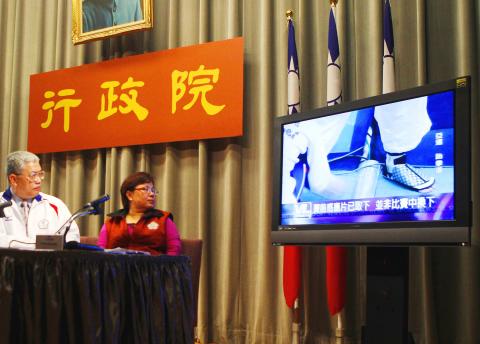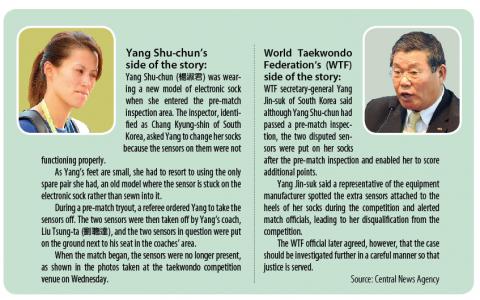In what many Taiwanese considered a belated action, the government yesterday held an international press conference voicing its support for Taiwanese taekwondo athlete Yang Shu-chun (楊淑君), who was controversially kicked out of the Asian Games in China on Wednesday, and called for a probe into the incident to ensure fair treatment for Taiwanese athletes.
President Ma Ying-jeou’s (馬英九) administration has been criticized for not standing up for Yang in the immediate aftermath of the row on Wednesday in which Yang, one of the nation’s gold medal hopefuls at the Games, had almost defeated Vietnam’s Vu Thi Hau in a women’s under-49kg bout when she was disqualified with 12 seconds left in the first round.
Yang was told by the judge that she was disqualified because two extra sensors on the heels of her foot guards were against regulations. Despite protests from the Taiwanese delegation, who insisted the sensors were carefully checked and approved before her match, the World Taekwondo Federation (WTF) remained adamant that its ruling was correct, suggesting that Yang had cheated and that she and her coach would face further sanctions for staging a sit-in protest following the judge’s ruling.

PHOTO: REUTERS
At the press conference held in Taipei yesterday, Vice Premier Sean Chen said that a press statement posted on the Asian Taekwondo Union’s (ATU) Web site titled “Shocking Act of Deception by Chinese Taipei” was “not only a slander to the reputation of the athlete herself [Yang],” but also “defamation of the whole country and its nationals.”
A videotape of the match on Wednesday recorded by Video-Land Inc showed Yang remove the sensors in question before the bout began and that she did not have them on during the bout. It also showed that after Yang was called over for an inspection with 12 seconds left in the first round of her bout, a taekwondo referee went to the other side of the mat to pick up the two sensors that had been previously discarded and brought them back to the head referee, who made the decision to disqualify Yang.
“The facts speak for themselves. It’s very clear that Yang did not have the two sensors attached to the heels of her socks during the match,” Chen said. “The accusation made by the ATU against Yang are far from the facts.”

GRAPHIC: TT
Chen said the disqualification was a “hasty decision” and the words the ATU chose to use in its accusation against Yang and the Taiwanese team were “irrational” and “not those that should be used on the official Web site of an international organization” such as the ATU.
He also accused the ATU of purposely misleading the public by suggesting that the Taiwanese team had a chance to explain its side of story when the WTF held a technical meeting to review the ruling by displaying on its Web site a photo of the meeting that included Chen Chien-ping (陳建平), chairman of the Chinese Taipei Taekwondo Association.
“I made a call to Chen Chien-ping. He told me that he did not attend the technical meeting, but was called in to be informed of its decision,” Sean Chen said.
Sean Chen said the government is prepared to file a complaint on the matter with the Lausanne-based Court of Arbitration for Sport (CAS), should Yang and the nation’s taekwondo association give their consent.
Sean Chen disagreed with reporters when facing questions about the government’s weak reaction to the incident and slow response in holding a press conference to state its official stance on the matter.
He said the Taiwanese delegation respected and followed established procedures in international competitions by filing a protest over the unfair ruling and waiting for arbitration.
“We initially thought the arbitration would have been made on the basis of the facts, but regrettably it was not. That’s why the government has made clear our solemn and firm position on the case after the arbitration process had been completed,” he said.
During the press conference, which lasted about 40 minutes, Sean Chen and Sports Affairs Council Deputy Minister Steven Chen (陳士魁) initially offered a softer stance. Sean Chen did not say the ATU should apologize over the incident until he was pressed by several reporters questioning the government’s bland response compared with the ATU’s accusation against Yang and Taiwan.
Late last night, the Executive Yuan followed up with a press statement, demanding that the ATU admit its mistake, offer an apology, give an explanation for the unfair ruling and offer reasonable compensation to Yang.
In the statement, the Executive Yuan questioned the fairness of the ruling as the ATU had changed its account over the past few days on the reason why Yang was disqualified.
“The discrepancies and inconsistencies in its different accounts prove that the ATU has been making up fallacious reasons in defense of its ruling,” the press release said.
Steven Chen said the ATU had agreed to reopen its investigation of the incident.
While the government will also ask the Olympic Council of Asia to look into the case, the Executive Yuan added it had also sent Minister Without Portfolio Ovid Tseng (曾志朗) to Guangzhou to look after Yang’s case.
Meanwhile, after staying mum for the past two days, the president yesterday broke his silence, pledging to fight for justice for Yang and demanding that the organizers offer a reasonable explanation after a thorough investigation of the incident.
“The fight will not stop until the organizers offer a legal and reasonable explanation. Until the truth comes out, we will not accept any accusations against the team. We oppose these accusations,” Ma said on the sidelines of a photo exhibition at the Huashan Creative Park.
“Yang spent over a year practicing for the contest and trained herself to be a great athlete. She passed all the inspections, but was disqualified. It is unacceptable for all of us,” he said.
Earlier yesterday, the Democratic Progressive Party (DPP) caucus accused the government of being weak in its handling of the incident.
DPP Legislator Wong Chin-chu (翁金珠) alleged the incident was a scheme by China to remove Yang from the competition so that its team could bag the gold medal.
The Taiwan Solidarity Union accused the government of attempting to downgrade the Yang incident from “an insult to the country” to “unfair treatment of an athlete.” It demanded that the government stop prolonging the matter by laying out a timetable for filing arbitration on the matter.
ADDITIONAL REPORTING BY RICH CHANG

CHAOS: Iranians took to the streets playing celebratory music after reports of Khamenei’s death on Saturday, while mourners also gathered in Tehran yesterday Iranian Supreme Leader Ayatollah Ali Khamenei was killed in a major attack on Iran launched by Israel and the US, throwing the future of the Islamic republic into doubt and raising the risk of regional instability. Iranian state television and the state-run IRNA news agency announced the 86-year-old’s death early yesterday. US President Donald Trump said it gave Iranians their “greatest chance” to “take back” their country. The announcements came after a joint US and Israeli aerial bombardment that targeted Iranian military and governmental sites. Trump said the “heavy and pinpoint bombing” would continue through the week or as long

TRUST: The KMT said it respected the US’ timing and considerations, and hoped it would continue to honor its commitments to helping Taiwan bolster its defenses and deterrence US President Donald Trump is delaying a multibillion-dollar arms sale to Taiwan to ensure his visit to Beijing is successful, a New York Times report said. The weapons sales package has stalled in the US Department of State, the report said, citing US officials it did not identify. The White House has told agencies not to push forward ahead of Trump’s meeting with Chinese President Xi Jinping (習近平), it said. The two last month held a phone call to discuss trade and geopolitical flashpoints ahead of the summit. Xi raised the Taiwan issue and urged the US to handle arms sales to

State-run CPC Corp, Taiwan (CPC, 台灣中油) yesterday said that it had confirmed on Saturday night with its liquefied natural gas (LNG) and crude oil suppliers that shipments are proceeding as scheduled and that domestic supplies remain unaffected. The CPC yesterday announced the gasoline and diesel prices will rise by NT$0.2 and NT$0.4 per liter, respectively, starting Monday, citing Middle East tensions and blizzards in the eastern United States. CPC also iterated it has been reducing the proportion of crude oil imports from the Middle East and diversifying its supply sources in the past few years in response to geopolitical risks, expanding

Pro-democracy media tycoon Jimmy Lai’s (黎智英) fraud conviction and prison sentence were yesterday overturned by a Hong Kong court, in a surprise legal decision that comes soon after Lai was jailed for 20 years on a separate national security charge. Judges Jeremy Poon (潘兆初), Anthea Pang (彭寶琴) and Derek Pang (彭偉昌) said in the judgement that they allowed the appeal from Lai, and another defendant in the case, to proceed, as a lower court judge had “erred.” “The Court of Appeal gave them leave to appeal against their conviction, allowed their appeals, quashed the convictions and set aside the sentences,” the judges